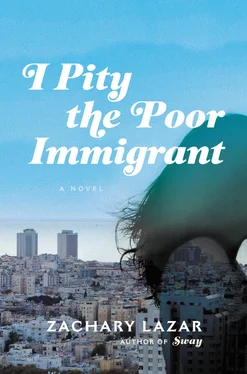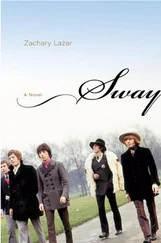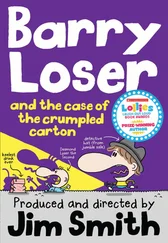
It was sunny the next morning and she and her father went to the nature preserve on Noyac Road, a place they always went. They could see cardinals in the thicket as they walked toward the bay. He was telling her that Gila had quit her job at the temple. It was something she’d wanted to do for a long time.
“We’re fond of each other,” he said then. “Maybe you already know that. I don’t know. I just wanted to tell you. I don’t expect you to be happy about it or to understand it, but I wanted to tell you. I tell you everything. That’s the rule.”
The leaves shone against the clear blue sky, a preposterous display — tupelo, oak — the colors throbbing faintly, they were so bright. She knew the names of the trees because her mother had taught them to her. Her mother had bought her the coat she was wearing, dark olive, the waxed cotton shiny like oilcloth, the kind of preppy jacket all the girls wore except the kind of girl she wanted to be now.
“I’m sorry,” her father said. “I’m sorry if this makes it worse. It was already the worst.”
It was when he touched her arm that she fully understood. It was like he was holding his hands over her face. She found herself clenching in spasm. All these things at once now: the embarrassment of her crying, the violence of it, the nausea quivering down her throat. Far ahead of them, a girl stood near the bushes, extending her hand, trying to get birds to eat seeds out of her open palm. The bushes were called catbrier. Catbrier, tupelo, oak. She didn’t know why she was crying. She scratched at her face but she didn’t feel anything but the sun glare. She pushed her father away and started running, as if there were anyplace to run.
She watched from the car as he carried Gila’s bag and they went into her building through the glass door. It was a squat red box, dwarfed by the white-brick complex that filled up the rest of the block all the way to York. There was a sign that said H. KOTZ MEDICAL SUPPLIES and beside it SYLVIE’S EUROPEAN ALTERATIONS, the signs so old they looked not like advertisements but commemorations. It was just blocks from where she lived, but the street was like a remnant of another world. It was the world of the temple, the world of Mr. Stone.
There would be Hebrew school next week, but Gila would not be there to teach it. Perhaps she would be here, in the squat red box, drinking tea in the dim rooms. To imagine this lonely picture was somehow to feel it as Hannah’s own fault, though it hadn’t even happened. She had run off into the woods crying like any other twelve-year-old girl.
The sun was hitting everything at a twilight slant when she finally got out of the car. She looked up at the building’s windows — she didn’t know which one was Gila’s — and at the empty black lattice of the fire escape. Some men were unloading furniture from an orange truck, black men in wool caps and sweatshirts and gloves, even though it wasn’t cold. Then she saw some movement behind the inner door of Gila’s building and she came closer. It was an old woman looking fiercely out, a bandage behind one lens of her glasses. She started shouting inaudibly through the door. Perhaps she was mistaking Hannah for someone else.
It was a long time before her father came back downstairs. He wore a beige wool overcoat, the strands of his white hair slicked back and revealing the bald skin beneath. There was that moment before he noticed her watching, a moment of such self-containment and strength that she never wanted him to turn — she wanted to disappear, if that’s what was required. Then he turned and looked at her without sympathy, as if they had suddenly become equals now. You told my story to Robby Karsh. I thought you understood why I told you that story. It was the last time they saw Gila together.
Part TwoIn the Presence of My Enemies
What we need is a memoir without a self.
A memoir about someone other than “me.”
Of course I can’t know what Gila and my father said or what they meant to each other almost thirty years ago, only what they came to mean to me as I imagined these scenes. While I imagined these scenes, what Gila and my father meant to each other meant more to me than I would have ever suspected. Twenty-eight years after it happened, I got a letter from Gila, who’d seen an essay I’d written about a murder in Israel, a Mafia-style murder. She wanted to tell me some things about her life in Tel Aviv, she said. It had been a long time — long enough, she hoped, that we could talk.

Benjamin Siegel

Meyer Lansky
A woman goes on a journey — Jerusalem, Bethlehem, Tel Aviv, then back to New York. I thought I was covering the murder of an Israeli poet named David Bellen, investigating a fairly straightforward crime story. But it became a story that led elsewhere, a story that led everywhere, a story I would have had no interest in if I hadn’t accidentally found myself inside it. I remember standing that first night in the narcotic gray light of the terminal at JFK, its vast glowing dome momentous and boring at the same time, like some disappointing portal to an afterlife of crowds. The women in their African robes, the men in soccer jerseys, the women from Jamaica with their bright suitcases — everyone seemed suspended in that gray light. Your name is Hannah, the El Al screeners said, a Hebrew name. They asked, more than once, “Why have you never been to Israel?”
Kid Bethlehem:
An Investigation into the Murder of David Bellen
by Hannah Groff
“We don’t choose our obsessions — our obsessions, invariably against our deepest wishes, choose us. Against our deepest wishes, we become suddenly, inexplicably committed to a path we had avoided, a line of thought we’d had no interest in.”
— David Bellen, 2008
1) GANGSTER STYLE
They found the poet David Bellen’s body on the morning of December 23, 2008, in a village called Beit Sahour, just outside Bethlehem, six miles from Jerusalem, about thirty-seven miles from Bellen’s home in Tel Aviv. As unlikely as it seemed, it was not a random place to find his body. Like other parts of the West Bank, Bethlehem has faced a growing and strategic expansion of Jewish settlements in recent years — provocation in a region rife with provocation. The city is also the setting for some of the poems in Bellen’s 2008 book, Kid Bethlehem, which is in many ways a critique of current Israeli policy in the Occupied Territories.
A preliminary statement by the Israeli Defense Forces described the murder as most likely an act of terrorism. As it happened, they were preoccupied at the time with larger matters — Hamas, the Islamist group that controls Gaza, on the other side of Israel from the West Bank, had just terminated a cease-fire agreement five days before. The day after Bellen’s murder, Hamas launched a series of mortar and rocket attacks on Israeli cities which set the stage for Israel’s retaliatory air strikes of December 27. Another war had begun, code-named Operation Cast Lead — the Gaza War. In the ensuing onslaught — F-16 fighter jets, AH-64 Apache helicopters, the white and gray plumes of smoke rising like ghostly fireworks over demolished buildings — Israel and the world at large almost inevitably lost sight of the story of David Bellen’s murder. As of this writing, the IDF says they are still looking for suspects. But even a basic question such as how someone like Bellen could have gotten from Tel Aviv to the Palestinian city of Bethlehem — how and why he could have possibly made such a journey, dead or alive — remains unanswered. 1
Читать дальше















